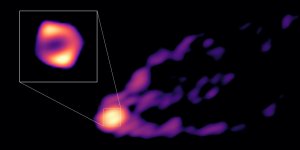| News / Science News |
New findings that map the universe’s cosmic growth support Einstein’s theory of gravity
The findings, from the Atacama Cosmology Telescope collaboration involving researchers from the University of Cambridge, provide further support to Einstein’s theory of general relativity, which has been the foundation of the standard model of cosmology for more than a century. The results offer new methods to demystify dark matter, the unseen mass thought to account for 85% of the matter in the universe.

The Atacama Cosmology Telescope (ACT). Photo: NASA
For millennia, humans have been fascinated by the mysteries of the cosmos. From ancient civilisations such as the Babylonians, Greeks, and Egyptians to modern-day astronomers, the allure of the starry sky has inspired countless quests to unravel the secrets of the universe.
And although models that explain the cosmos have existed for centuries, the field of cosmology, where scientists use quantitative methods to understand the evolution and structure of the universe, is relatively new—having only formed in the early 20th century with the development of Albert Einstein’s theory of general relativity.
Now, a set of papers submitted by researchers from the Atacama Cosmology Telescope (ACT) collaboration has produced a new image that reveals the most detailed map of matter distributed across a quarter of the entire sky, reaching deep into the cosmos. It confirms Einstein’s theory about how massive structures grow and bend light, with a test that spans the entire age of the universe.
“We have mapped the invisible dark matter across the sky to the largest distances, and clearly see features of this invisible world that are hundreds of millions of light-years across,” said co-author Professor Blake Sherwin from Cambridge’s Department of Applied Mathematics and Theoretical Physics, where he leads a group of ACT researchers. “It looks just as our theories predict.”
Although dark matter makes up a large chunk of the universe and shaped its evolution, it has remained hard to detect because it doesn’t interact with light or other forms of electromagnetic radiation. As far as we know, dark matter only interacts with gravity.
To track it down, the more than 160 collaborators who have built and gathered data from the National Science Foundation’s Atacama Cosmology Telescope in the high Chilean Andes observe light emanating following the dawn of the universe’s formation, the Big Bang—when the universe was only 380,000 years old.
Cosmologists often refer to this diffuse light that fills our entire universe as the “baby picture of the universe,” but formally, it is known as the cosmic microwave background radiation (CMB).
The team tracks how the gravitational pull of large, heavy structures including dark matter warps the CMB on its 14-billion year journey to us, like how a magnifying glass bends light as it passes through its lens.
“We’ve made a new mass map using distortions of light left over from the Big Bang,” said Mathew Madhavacheril from the University of Pennsylvania, lead author of one of the papers.
“Remarkably, it provides measurements that show that both the ‘lumpiness’ of the universe, and the rate at which it is growing after 14 billion years of evolution, are just what you’d expect from our standard model of cosmology based on Einstein's theory of gravity.”
“Our results also provide new insights into an ongoing debate some have called ‘The Crisis in Cosmology’,” said Sherwin. This crisis stems from recent measurements that use a different background light, one emitted from stars in galaxies rather than the CMB.
These have produced results that suggest the dark matter was not lumpy enough under the standard model of cosmology and led to concerns that the model may be broken.
However, the team’s latest results from ACT were able to precisely assess that the vast lumps seen in this image are the exact right size.
“When I first saw them, our measurements were in such good agreement with the underlying theory that it took me a moment to process the results,” said Cambridge PhD candidate Frank Qu, lead author of one of the new papers.
“But we still don’t know what the dark matter is, so it will be interesting to see how this possible discrepancy between different measurements will be resolved.”
“The CMB lensing data rivals more conventional surveys of the visible light from galaxies in their ability to trace the sum of what is out there,” said Suzanne Staggs from Princeton University, Director of ACT.
“Together, the CMB lensing and the best optical surveys are clarifying the evolution of all the mass in the universe.”
“When we proposed this experiment in 2003, this measurement wasn’t even on our agenda; we had no idea the full extent of information that could be extracted from our telescope,” said Mark Devlin, from the University of Pennsylvania, Deputy Director of ACT.
“We owe this to the cleverness of the theorists, the many people who built new instruments to make our telescope more sensitive, and the new analysis techniques our team came up with.” (University of Cambridge)
YOU MAY ALSO LIKE





